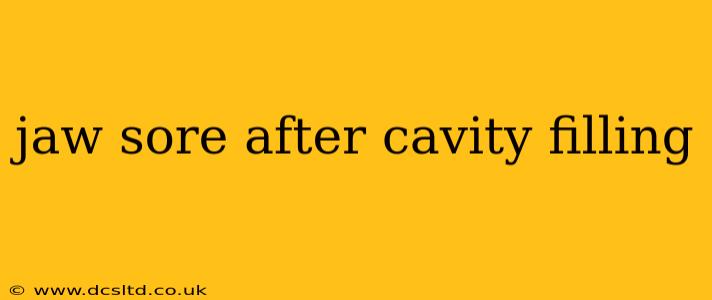A sore jaw after a cavity filling is a common experience, often caused by the procedure itself or a related issue. While usually temporary, understanding the potential causes and how to manage the discomfort is crucial for a swift recovery. This comprehensive guide explores the reasons behind jaw soreness post-filling, effective relief methods, and preventive measures.
Why Does My Jaw Hurt After a Filling?
Several factors can contribute to jaw pain following a cavity filling:
-
Inflammation: The filling process involves drilling and potentially injecting anesthetic, which can cause minor inflammation in the surrounding tissues. This inflammation can lead to localized pain and discomfort, often manifesting as jaw soreness. The body's natural healing response is often the culprit.
-
Muscle Strain: During the procedure, you might unconsciously clench or tense your jaw muscles. This tension can persist afterward, resulting in soreness and stiffness. Anxiety related to the procedure can exacerbate this muscle strain.
-
Infection: While less common, an infection at the filling site is a possibility. This would present as more intense pain, potentially accompanied by swelling and fever. Seek immediate dental attention if you suspect an infection.
-
TMJ (Temporomandibular Joint) Dysfunction: The temporomandibular joint connects your jaw to your skull. Stress, grinding teeth (bruxism), or even the procedure itself can aggravate TMJ issues, leading to jaw pain. This pain is often broader than just the area around the filling.
-
High Filling: If the filling is placed too high, it can interfere with your bite, causing your jaw muscles to work harder and leading to soreness. This is a problem that needs to be addressed by your dentist.
-
Improper Bite: A misaligned bite can also lead to jaw pain, especially after a filling procedure that might have slightly altered your bite. This can put extra stress on certain jaw muscles.
How Long Does Jaw Soreness After a Filling Last?
The duration of jaw soreness varies greatly depending on the individual and the underlying cause. In most cases, mild discomfort resolves within a few days to a week. However, if the pain is severe, persistent, or accompanied by other symptoms like swelling or fever, it's essential to consult your dentist immediately.
What Can I Do to Relieve Jaw Soreness After a Filling?
Several strategies can help alleviate jaw soreness:
-
Over-the-Counter Pain Relief: Nonsteroidal anti-inflammatory drugs (NSAIDs) like ibuprofen or naproxen can effectively reduce pain and inflammation. Always follow the recommended dosage.
-
Cold Compress: Applying a cold compress to the affected area for 15-20 minutes at a time can help reduce swelling and numb the pain.
-
Warm Compress: After the initial 24-48 hours, switching to a warm compress can help relax the jaw muscles and relieve tension.
-
Gentle Jaw Exercises: Your dentist might recommend gentle jaw stretches and exercises to improve mobility and reduce stiffness. Avoid strenuous activities.
-
Soft Foods: Stick to soft foods that require minimal chewing to reduce stress on your jaw. Soups, yogurt, and mashed potatoes are good options.
-
Rest: Resting your jaw as much as possible is crucial for healing. Avoid activities that require significant jaw movement.
How Can I Prevent Jaw Soreness After a Filling?
-
Communicate with Your Dentist: Clearly communicate any concerns or existing jaw problems with your dentist before the procedure.
-
Stress Management: Manage stress levels before and after the procedure to reduce jaw clenching and tension.
-
Proper Bite Adjustment: If your dentist detects any bite issues, address them promptly to prevent jaw pain.
-
Post-Procedure Care: Follow your dentist's post-procedure instructions carefully to minimize discomfort and complications.
Disclaimer: This information is for general knowledge and does not constitute medical advice. Always consult your dentist or a qualified healthcare professional for diagnosis and treatment of any medical condition. They can provide personalized recommendations based on your specific circumstances.
